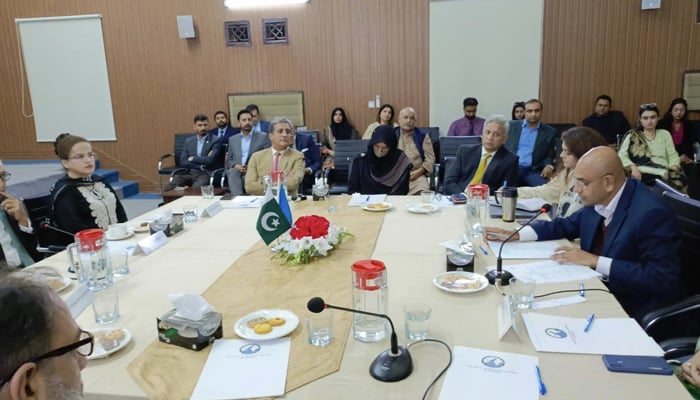‘Nehru kept Jinnah oblivious of his correspondence with Mountbatten, Kashmiri Pundits’
Islamabad: Jinnah was running to a completely different direction as he was unaware of secretive communications between Nehru, Lord Mountbatten and Maharaja Hari Singh during Kashmir’s accession, said Dr Dushka Hyder Saiyid, former Professor of History, Quaid-i-Azam University.
Dr Dushka was addressing a Roundtable discussion on “Narratives on Kashmir” organised by Institute of Regional Studies (IRS) in collaboration with Centre for International and Strategic Studies (CISS), Azad Jammu and Kashmir here Thursday.
Dr Dushka told the participants that with Nehru’s connivance, Hari Singh signed an instrument of accession to India, adding that the decision was taken right after a day when Indian troops landed in Srinagar on Oct 26, 1947. She further told that Mountbatten was the very much part of the Kashmir’s accession to India as he clandestinely supported Nehru.
Earlier, Dr Asma Shakir Khawaja, Executive Director, CISS, said that the revocation of Article 370, and 35 A, was nothing but a part and parcel of India’s systematic political and demographic engineering in the Occupied Kashmir that had threatened the very basis of the right of self-determination.
British historian Victoria Schofield argued that the very reason behind the lukewarm support of the international community for Kashmir cause was the changed narrative of freedom fighting in the post-9/11 era in which the Kashmiri struggle was unfortunately equated with terrorism. On human rights, she said that the situation further deteriorated after the revocation of Article 370, and for that, a serious dialogue between Pakistan and India was needed, she emphasised.
Dr Christopher Snedden, an Austrian political scientist, was of the view that bringing India and Pakistan to the table was indeed a challenge, equally building international pressure on India to resolve the Kashmir dispute was also a challenge, he added. Echoing what Schofield said, Dr Snedden stressed the need to work on giving relief to the Kashmir people. Former High Commissioner Abdul Basit held that India would never reverse its August 2019 decision so Pakistan needed to review its policies accordingly and devise a workable strategy vis-à-vis the Kashmir issue. He was quite hopeful that sanity would prevail and the new governments both in India and Pakistan after the elections would make a sensible start through a meaningful engagement.
-
 Jerome Tang Calls Out Team After Embarrassing Home Defeat
Jerome Tang Calls Out Team After Embarrassing Home Defeat -
 Cynthia Erivo Addresses Bizarre Rumour About Her Relationship With Ariana Grande
Cynthia Erivo Addresses Bizarre Rumour About Her Relationship With Ariana Grande -
 Prince Harry, Meghan Markle Spotted Cosying Up At NBA All-Star Game
Prince Harry, Meghan Markle Spotted Cosying Up At NBA All-Star Game -
 Lady Gaga Explains How Fibromyalgia Lets Her 'connect With People Who Have It'
Lady Gaga Explains How Fibromyalgia Lets Her 'connect With People Who Have It' -
 Metro Detroit Weather Forecast: Is The Polar Vortex Coming Back?
Metro Detroit Weather Forecast: Is The Polar Vortex Coming Back? -
 Daniel Radcliffe Reveals Surprising Way Fatherhood Changed Him
Daniel Radcliffe Reveals Surprising Way Fatherhood Changed Him -
 ‘Disgraced’ Andrew At Risk Of Breaking Point As Epstein Scandal Continues
‘Disgraced’ Andrew At Risk Of Breaking Point As Epstein Scandal Continues -
 Alan Cumming Shares Plans With 2026 Bafta Film Awards
Alan Cumming Shares Plans With 2026 Bafta Film Awards -
 OpenClaw Founder Peter Steinberger Hired By OpenAI As AI Agent Race Heats Up
OpenClaw Founder Peter Steinberger Hired By OpenAI As AI Agent Race Heats Up -
 Kate Middleton's Reaction To Harry Stepping Back From Royal Duties Laid Bare
Kate Middleton's Reaction To Harry Stepping Back From Royal Duties Laid Bare -
 Rose Byrne Continues Winning Streak After Golden Globe Awards Victory
Rose Byrne Continues Winning Streak After Golden Globe Awards Victory -
 Ice Hockey Olympics Update: Canada Stays Unbeaten With Dominant Win Over France
Ice Hockey Olympics Update: Canada Stays Unbeaten With Dominant Win Over France -
 Brooklyn Beckham Makes This Promise To Nicola Peltz Amid Family Feud
Brooklyn Beckham Makes This Promise To Nicola Peltz Amid Family Feud -
 Chinese New Year Explained: All You Need To Know About The Year Of The Horse
Chinese New Year Explained: All You Need To Know About The Year Of The Horse -
 Canadian Passport Holders Can Now Travel To China Visa-free: Here's How
Canadian Passport Holders Can Now Travel To China Visa-free: Here's How -
 Maya Hawke Marries Christian Lee Hutson In New York Ceremony
Maya Hawke Marries Christian Lee Hutson In New York Ceremony




